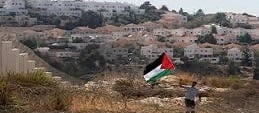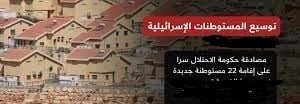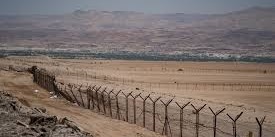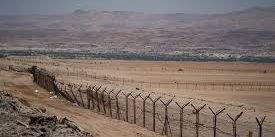By: Madeeha Al-A’raj
The national Bureau for Defending Land and Resisting Settlements stated in its latest weekly report , that in a joint letter addressed to the Israeli Government’s attorney general, Gali Baharav Miara, and the Military Advocate General, Major General Yifat TomerYerushalmi, some 20 Israeli academic figures expressed their concern that the occupying state is working to uproot civilians from the northern Gaza Strip, saying: “The uprooting of civilians from northern Gaza raises serious concerns about the possibility of violating the laws of war and even committing a war crime, adding: according to reports in the Israeli and international media and testimonies from the field, there are serious concerns that the current uprooting of civilians from northern Gaza doesn’t meet the requirements of international law for evacuating civilians from conflict zones, especially since mass evacuation is an exceptional measure that can only be justified by a necessary military motive or to protect the civilians themselves.
In such circumstances, and without a clear military justification that requires a mass evacuation of all residents of northern Gaza, and in light of the statements of some prominent ministers, this raises concerns that the goal is not to protect the residents, but to deport them for political reasons. There is a particular danger in the absence of a clear Israeli commitment that the displaced residents will return to their homes immediately after the end of the military operation, and there are statements from Israeli spokesmen suggesting an intention to prevent their return.
The figuresare experts in International Law, including, Dr. Shelly Aviv-Yini, an expert in International Law at the University of Haifa; Professor Eliav Lieblich, professor of International Law at Tel Aviv University; Professor Eyal Gross, professor of Constitutional Law and International Law at Tel Aviv University; Professor Yuval Shani, professor at the Faculty of Law at the Hebrew University and Deputy Dean of the Faculty of Law at the Hebrew University; and Professor Tomer Brody.
Messageof the Academic figures didn’t tackle the actual goal of the mass evacuation policy, which has been taking place for some time in the northern Gaza Strip, but the idea has become clear and means evacuating the place and paving the way for normalizing the idea of returning settlement to the Gaza Strip step by step, as confirmed by former Likud Minister Limor Livnat, who expressed her shock on more than one occasion at the idea itself, an idea that Netanyahu considered ‘unrealistic in such circumstances’ and at the same time gave free rein to the parties of his government coalition to promote it and prepare to launch it when the situation allows.
This is indicated by the return of military rule to the Gaza Strip and the emptying of the northern Gaza Strip of its residents and all the arrangements that are taking place, whether in the Netzarim axis in the center of the Strip or the Philadelphi axis in its south, in addition to linking security to settlement, in a refrain repeated by the Minister of Finance and Minister of Settlement in the Ministry of Army, Bezalel Smotrich, ‘Wherever there are settlements, there will be soldiers, and therefore security will prevail there.’
Linking settlement to transfer, as National Security Minister Itamar Ben-Gvir sees it, settlement is linked to transfer, or what is called in euphemistic language ‘encouraging immigration,’ which Ben-Gvir, from the Kiryat Arba settlement considers ‘the most moral solution.’ There are many like Ben-Gvir in the occupying state, as settlement in Gaza requires a basic condition that was also set by Daniela Weiss, who is leading the campaign to return to the settlements of the Gaza Strip, but this time under the title ‘Gaza is empty of Arabs.’ Smotrich follows in her footsteps: “If only 200,000 Palestinians remained in Gaza instead of two million, everything would be easier.”
Within the context, the Hebrew Newspaper Ha’aretz reported last week through its editor-in-chief, Aluf Benn, that Netanyahu and his right-wing government are preparing for the next stage of the war on Gaza, which includes ‘preparing for settlement and annexation of the northern Gaza Strip,’ in addition to ‘gradually preparing the area for Jewish settlement and annexation to Israel.’ Aluf Benn considered that the entry into the new stage of the war ‘began with a bureaucratic announcement issued on August 28 regarding the appointment of Brigadier General Elad Goren as head of civilian humanitarian efforts in the Gaza Strip within the Israeli government’s Coordination of Government Activities Unit.’ ‘This long title that Goren holds will remain until the Israeli army creates an abbreviation for it, equivalent to the head of the Civil Administration in the West Bank.”.
Oneshould consider the participation of hundreds of right-wing and nationalist Israelis three weeks ago in a conference on the re-establishment of settlements in the Gaza Strip. The conference, which was held near the border with Gaza, attracted a number of prominent parliamentarians, including from PM Netanyahu’s Likud party. It became clear that since Oct. 7, 2023, the movement to re-settle Gaza has moved from the extreme fringes of Israeli society to the political discourse among Netanyahu’s partners in the right-wing coalition. Ben-Gvir was one of the stars of the conference and his speech to the crowd was met with great applause,‘the Land of Israel belongs to all of us,’ adding that encouraging the emigration of Gazans is ‘the most moral solution,’ before calling for the re-establishment of Israeli settlements in the Gaza Strip. Meanwhile, Tzvi Sukkot, a member of the Religious Zionism Party, said that ‘returning’ to Gaza means ‘pushing Hamas,’‘a heavy ideological price for the war you waged against us.’
Information leaked from the conference indicated that a request had already been submitted to build 40 units to settle Jewish families in Gaza and that hundreds of people were planning to build them. Daniela Weiss, head of the ‘Nahala settlement’ movement, presented the new settlement map and confirmed to the attendees,‘We have already requested and paid for the 40 units that we plan to bring into Gaza,’ and announced that representatives of 700 families are expected to be the arrowhead in this process, adding that the residents of Gaza will not remain in Gaza, and that anyone from Gaza who wants to live a normal life will be allowed to immigrate to countries around the world. In mid-September, 27 ministers and members of the Israeli Knesset from the ruling coalition sent a letter to the head of the occupation government, Netanyahu, demanding that the cabinet convene to adopt the ‘generals’ plan,’ which includes evacuating northern Gaza, preventing humanitarian aid from reaching it, and declaring it a closed military zone.
In the West Bank, things are even more complicated, as settlement activity in wartime conditions continues at a high pace and takes on extreme forms. Ben-Gvir and Smotrich are waging a declared war on the Palestinian existence, aiming to impose forced displacement and establish a ‘settler state.’ Ben-Gvir, as known, lives in the settlement of Kiryat Arba in Hebron and serves as Minister of National Security; his authority falls under the police. Smotrich lives in the settlement of Kedumim in the Qalqilia Governorate, serves as Minister of Finance and Minister of Settlement in the Ministry of Army, and from this position he exercises control over the Civil Administration.
Ben-Gvir and Smotrich have broad influence on Netanyahu’s decisions, and through that, they are pushing for unprecedented and extreme settlement policies in the West Bank. They are not content, for example, with pushing the government to confiscate large areas of land extending from east of Ramallah to the outskirts of Jericho and granting them to settlers ‘this area is about 150,000 dunams, equivalent to 3 times the area of the Tel Aviv Municipality’, nor are they content with licensing the construction of thousands of housing units in the settlements or legalizing illegal settlement outposts, but they are also pushing for the expansion of the establishment of so-called ‘pastoral farms’ and filling them with armed juvenile delinquents and inciting them, along with the terrorist ‘Hill Youth – Price Tag’ to spread destruction in the Palestinian countryside during the olive harvest season for the second year in a row.
These days, the war on the Palestinians in the West Bank has taken on new dimensions in the context of war and during the olive harvest season. The goal is to isolate the Palestinians from their lands, which they used before Oct. 7 without major obstacles. The Palestinians must ask the occupation army to allow them to reach their lands adjacent to the settlements to harvest the olive crop or tend their wooded lands. The occupation army usually procrastinates and plays a double game, giving coordination permits to Palestinian citizens without providing them with protection from settler attacks, then intervening later by asking Palestinians to leave the area, so that the settlers see a greater freedom of movement and practicing all forms of arrogance, sabotage and terrorism, which cast its shadow over the Palestinian countryside in various governorates, as is the case in the Salfeet Governorate, where Deiristiya, Kafr ad-Dik, Deir Ballut and Yasuf were subjected to attacks by settlers, who set out from neighboring settlements and their terrorist settlement outposts, such as the ‘Neve Nehemiah outpost’ on the lands of Yasuf and the ‘pastoral outpost’, which the settlers established on the lands of Kafr ad-Dik and others to prevent citizens from reaching their lands, or in the Ramallah governorate, where settler terrorism raided the industrial zone of the city of al-Bireh last week in a dangerous and unprecedented escalation, while its villages were subjected to attacks by the hilltop youth, the terrorist “price tag” and juvenile delinquents in the so-called pastoral farms, as is the case in the villages of Barqa, Sinjil, Turmus Ayya, Kafr Malik and Al-Mughayyir.
In the Hebron and Bethlehem Governorates, in the West Bank, the Palestinian countrysidewas subjected last week to an uninterrupted series of terrorist attacks. In the Hebron governorate, Surif, Tarqumiya, Birin, Tel Rumeida, Farsh Al-Hawa and the lands adjacent to the Kiryat Arba settlement were subjected to such attacks, where they were prevented from approaching 3,000 dunams planted with olive trees. Meanwhile, the settlers in the Bethlehem Governorate tried to control about 1200 dunams, between Khalayel Al-Loz, Khallet Al-Qatn and Khallet Al-Nahla, to separate the city of Bethlehem from its southern countryside and connect the settlements of ‘Efrat and Teqoa’ to each other, in an area inhabited by about 3,000 Palestinian citizens. Thesettlers, with the clear complicity of the occupation army, escalated their attacks and prevented citizens from reaching their lands in the village of Husan and the areas of Wadi Qadis in the vicinity of the settlement of Beitar Illit, which is perched on citizens’ lands, to pick olives.
As for the northern West Bank, there are no calm day at all over the last week. The Israeli killing machine works around the clock, especially in Tulkarm, Jenin, and Nablus as well. Settlers also attacks Palestinian citizens around the clock, due to the widespread presence of settlement outposts and terrorist pastoral farms that work under the head of the Likud settlement council, who is the most extremist among the settler leaders Yossi Dagan, who supports settler terrorism in the northern West Bank in particular, and in the West Bank in general, this terrorism strikes hard in the villages and towns of Nablus Governorate, such as, Yatma, Jalud, Qariot, Qusra, Duma, Aqraba, Yanun, Beit Furik, and Beit Dajan to the east and southeast of the city of Nablus to Asira al-Qibliya, Madama, Burin, and Beita in the south and even Deir Sharaf to the west of the city. In Jalud, citizens were denied access to 500 dunams of their land planted with olives, and in Qaryut, terrorist groups from the settlements are committing a massacre against a large area of land planted with old olive trees, as well as in Yanun, settlers, under cover of the occupation army, are putting pressure on the area with the aim of evacuating its residents.
List of Israeli Assaults over the Last Week Documented by the National Bureau:
Jerusalem:
- Demolishing 3 buildings containing 8 residential apartments in the Al-Bustan Neighborhood in Silwan, under the pretext of not having a permit. The demolition operation came within the framework of an Israeli plan to demolish dozens of homes inhabited by about 1,550 Palestinians in the neighborhood, in preparation for establishing a biblical garden on its ruins.
- Notifying the demolition of the Al-Shiyah Mosque within 5 days, noting that it has been built for 20 years in Jabal al-Mukaber.
- Demolishing one-story house belonging to the Ayed family in the Silwan town. They also forced the citizen, Dharar Darwish, to demolish an agricultural facility and a residential room that he owned, on the pretext of not having a permit in the village of Issawiya.
Hebron:
- Attacking homes in the ‘Deir al-Nil area’ in the Surif town,, fired live bullets at them, and broke the windows of three homes belonging to the Ghneimat family, and set fire to the surrounding area.
- Assaulting farmers and forcibly prevented them from reaching their lands in the town of Tarqumiya,.
- Attacking olive pickers, stolen a citizen’s vehicle in the Birin area,. The occupation forces also forced farmers in the Um Nir area to leave their lands and prevented them from picking olives.
- Attempting to run over citizen Yasser Abu Markhia,52, in Tel Rumeida, while he and a group of boys were transporting the needs of the “Joy and Fun” event that he is preparing to hold at the Ibrahim al-Khalil Association to entertain children in that area, in light of the ongoing attacks they suffer from by occupation soldiers and settlers.
- Demolishing a house in the Jourat al-Jamal area belonging to citizen Yaqoub al-Masri in the Yatta town. They also notified the demolition of the house of the martyr Muhannad al-Aswad in the Dhakhra area in the town of Idhna, west of Hebron.
Bethlehem:
- Erecting a mobile home in the Khalayel Al-Loz area, southeast of Bethlehem, and a number of settlers tried to seize lands of about 1,200 dunams, between Khalayel Al-Loz, Khallet Al-Qattan, and Khallet Al-Nahla, belonging to the Abu Kamil and Al-Abayat families.
- Preventing citizens from picking olives in Husan in the Wadi Qadis area, while settlers began ploughing dozens of dunams of land belonging to citizens in the Khalayel Al-Loz, Khallet Al-Qattan, and Khallet Al-Nahla areas, south of Bethlehem, in preparation for seizing them.
Ramallah:
- Burning about 20 vehicles after they attacked the industrial zone in the Al-Bireh city and fired into the air and at civil defense vehicles when they arrived to put out the fire, before fleeing. The vehicle fire caused extensive damage to residential buildings whose exterior facades were burned by the force of the fire. Settlers also burned a vehicle in the Deir-Dibwan town, and wrote racist slogans on a retaining wall.
- Attacking olive pickers in the Wadi al-Shami area and set fire to olive trees and a number of citizens’ homes after storming the Burqa village.
- Stealing olives of citizens, Samir Abu Aliya, Rateb al-Naasan, and Nael al-Hajj Moh’d.
- Preventing residents of the village of Qalandia from picking olives after they closed the iron gate in the apartheid wall, which prevents residents from reaching their lands.
- Burning a vehicle belonging to Mustafa Moh’d Ka’bneh in the Bedouin community of ‘Al-Ras’ between the villages of Al-Mughayyir and Kafr Malik, and wrote racist slogans.
- Preventing farmers in the Turmusaya town from picking olives, expelled farmers from the land, and confiscated olives and mattresses.
Nablus:
- Attacking olive pickers in Jalud lands in the eastern part of the village, preventing them from picking olives, and opened fire on anyone who approached the lands.
- Forcing farmers to evacuate their lands in Khirbet Yanun, which is part of Aqraba lands, south of Nablus, after seizing olive picking mats and equipment.
- Preventing farmers in the village of Qasra at gunpoint from completing the olive picking and dismissed them from their lands.
- Handing over orders to stop construction in the village of Duma, south of Nablus in the eastern part of the village, including 7 tents, an agricultural room and a wall, under the pretext of building without a permit in Area C. The occupation forces also delivered 6 notices to stop construction and demolish homes in the New Nablus area, including 2 under construction and 4 inhabited homes, under the pretext of building without a permit.
- Cutting down more than 500 old olive trees in the village of Qariot.
Salfeet:
- Writing racist slogans and drawings on workers’ cars parked on the main road around the industrial zone in the ‘Ariel settlement’, while the occupation forces prevented farmers from picking olives in the town of Deiristiya, and forced farmers at gunpoint to leave their lands under the pretext that it is a closed military zone. In the same town, a settler assaulted farmers while they were picking olives.
- Attacking olive pickers in the ‘Khalat al-Haramiyah’ area west of the Kafr-Dik town and tried to force them to leave their lands and prevent them from picking olives.
- Expelling farmers from their lands and prevented them from picking olives north of Yasuf in the Bab al-Asrab and al-Khala areas. In another attack in Yasuf, security guards from the settlement of Neve Nehemiah attacked the farmer Naim Moh’d Ubaid, expelled him from his land, and confiscated his mobile phone and 4 sacks of olives in the al-Hariqa and al-Sarab areas.
Tulkarem:
- Setting fire to the lands of Ramin Plain planted with olive trees east of Tulkarm. They brutally pursued the olive pickers and forced them at gunpoint to leave their lands and prevented them from completing their work.
- Attacking the farmers while they were picking olives and seized their olives in the village of Shufa. They were expelled from their lands and threatened not to return to them at gunpoint.
- Expelling a number of farmers and their families from the Kafr-Labad village east of Tulkarm while they were on their lands to pick olives there. They prevented them from picking the olives, and they also chopping more than 100 old and perennial olive trees.
Jordan Valley:
- Attacking citizens in the Bedouin Community of Shalla al-Auja, northwest.
- Erecting barbed wires around 2 houses, while children and women were inside, raided al-Maleh Elementary School in the northern Jordan Valley and forced the teaching staff to leave amid fears of future demolition operations.
- Attacking 3 Palestinian families and stole bags of olives and mattresses from them under the protection of the occupation forces in the Ras al-Aqaba area
- Demolishin g a residential facility in the Makhrouq area, with an estimated area of 120m2.
- Seizing a plot of land estimated at five dunams and planted it with olive trees in Al-Farisiyas. Notingthat the seized land is planted annually by citizens with rain-fed crops. Twoweeks ago, settlers seized another plot of land in the same area and planted it with olives.
 المكتب الوطني للدفاع عن الارض ومقاومة الاستيطان منظمة التحرير الفلسطينية
المكتب الوطني للدفاع عن الارض ومقاومة الاستيطان منظمة التحرير الفلسطينية




